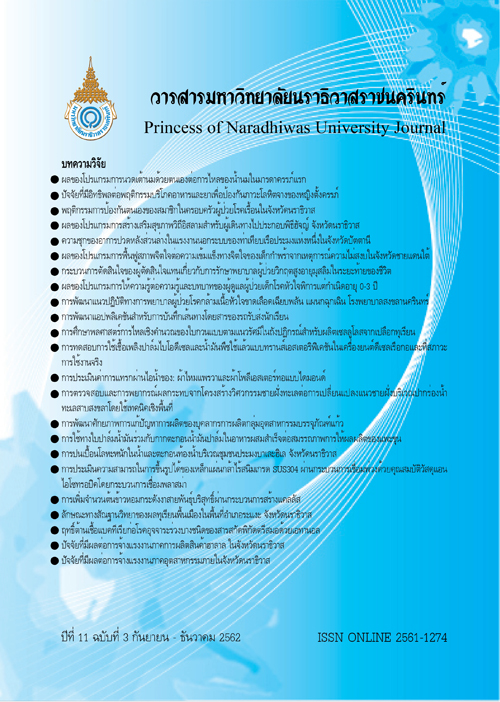The Effect of Education Program on Knowledge and Role in the Caregiver for Children with Congenital Heart Disease Aged 0 - 3 Years
Keywords:
The supportive education nursing system, Caregivers, Children with congenital heart diseaseAbstract
This quasi - experimental study was designed to determine the effectiveness of a supportive - educative nursing system program on knowledge and caregiver role for caring children with congenital heart disease
aged 0 - 3 years at outpatient building of Naradhiwas hospital. Twenty four subjects were purposively selected into the experimental and control group. The experimental group was caregivers who participated in the supportive educational nursing program while the control group was only received routine nursing care. The research instruments were the supportive educational nursing program and handbook for caring children with congenital heart disease. Data were collected by using a two-section questionnaire; caregiver knowledge and caregiver role for caring children with congenital heart disease. The reliabilities for the questionnaires were 0.76 and 0.80 respectively. Data were analyzed by using descriptive statistic and t - test.
The research results presented that the experimental group had a different mean scores of caregiver knowledge when compared to before experiment (t = 4.92, p < .001) and were significantly higher
than that in the control group (t = 2.81, p < .01). The experimental group had a different mean score of
caregiver role in caring when compared to before experiment (t = 4.43, p < .001), but it did not differ when
compared to the control group
The supportive educational nursing program is an appropriate guideline to educate caregivers so that they have effective knowledge and improve home care of children with congenital heart disease effectively
References
Chuambangphae, C., & Tangkiratichai, S. (2013). Effectiveness of two - phase - discharge plan program for children undergoing open heart surgery upon parental care practice and continuing care management. Mahasarakham Hospital Journal, 10(3), 22 - 30.
Chunpetch, A., Sivadamrongpong, W., & Yeepaloh, M. (2014). Beliefs about foods and food preparation experiences for childhood with malnutrition of native Muslim mothers living in Yala province. Journal of nursing and Education, 7(3), 24 - 34.
Chaweethamawat, A., Kongsaktrakul, C., & Kaveevivitchai, C. (2012). Development of computer - assisted instruction on knowledge of congenital heart disease for school-aged children with congenital heart disease. Kuakarun Journal of Nursing, 19(2), 118 - 134.
Edraki, M., Kamali, M., Beheshtipour, N., Amoozgar, H., Zare, N., & Nontaseri, S. (2014). The effect of educational program on the quality of life and self efficacy of the mothers of the infants with congenital heart disease. International Journal of Community Based Nursing & Midwifery, 2(1), 51 - 59.
Keawvichit, N., & Thajeen, K. (2007). Knowledge and the parental role in caring for children with heart disease. Songklanagarind Medical Journal, 25(4), 273 - 282.
Koon-aree, S., Pukdeepin, P., & Sangmanee, W. (2015). Effect of information education via a comic book on anxiety of school - aged children undergoing a cardiac catheterization. Songklanagarind Journal of Nursing, 35(2), 129 - 141.
Mari M.A., Cascudo M.M., & Alchieri J.C. (2016). Congenital heart disease and Impacts on child development. Brazilian Journal of Cardiovascular Surgery, 31(1), 31 - 37.
Nousi, D., & Christou, A. (2010). Factors affecting the quality of life in children with congenital heart disease. Health Science Journal, 4(2), 94 - 100.
Payomhom, C., Seeda R., & Wichiencharoen, K. (2013). The effect of education program on maternal care for children with congenital heart disease undergone post open - heart surgery. Thai Journal of Cardio - Thoracic Nursing, 24(1), 31 - 43.
Phromreungrit, K., Jintrawet, U., & Chotibang, J. (2015). Caregiving and related factors among caregivers of children with congenital heart disease. Nursing Journal, 42, 35 - 45.
Orem, D.E. (2001). Nursing: concept of practice (6th ed.). St. Louis: Mosby year book Srichantaranit, A., & Chontawan, R. (2011). Caring for infants with congenital heart disease prior to Cardiac Surgery: the impacts on families. Journal of Nursing Science, 29(2), 7 - 18.
Songthip, S., Sanasuttipun W., & Srichantaranit, A. (2015). The effects of supportive – education nursing system program on knowledge and behaviors of mothers of children with acyanotic congenital heart disease aged 0 - 2 years. Thai Journal of Cardio - Thoracic Nursing, 26(2), 25 - 38.
Triedman, J.K., & Newberger, J.W. (2016). Trends in congenital heart disease the next decade. Circulation, 133, 2716 - 2733. Retriveved from http://ahajournals.org




